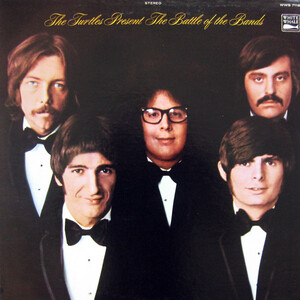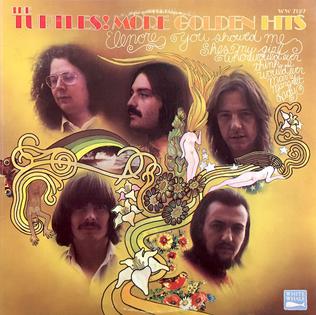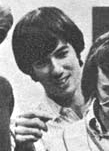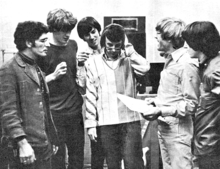
Robert Michael Nesmith was an American musician, songwriter, and actor. He was best known as a member of the Monkees and co-star of their TV series of the same name (1966–1968). His songwriting credits with the Monkees include "Mary, Mary", "The Girl I Knew Somewhere", "Tapioca Tundra", "Circle Sky" and "Listen to the Band". Additionally, his song "Different Drum" became a hit for Linda Ronstadt and the Stone Poneys.

The Monkees were an American pop rock band formed in Los Angeles in the mid-1960s. The band consisted of Micky Dolenz, Davy Jones, Michael Nesmith, and Peter Tork. Spurred by the success of the television show of the same name, the Monkees were one of the most successful bands of the late 1960s. With international hits, four chart-topping albums and three chart-topping songs, they sold more than 75 million records worldwide.

George Michael Dolenz Jr. is an American musician and actor. He was the drummer and one of two primary vocalists for the pop rock band the Monkees, and a co-star of the TV series The Monkees (1966–1968). After the death of Michael Nesmith on December 10, 2021, Dolenz is the last surviving member of the band.

Peter Halsten Thorkelson, better known by his stage name Peter Tork, was an American musician and actor. He was best known as the bass guitarist and keyboardist of the Monkees and co-star of the NBC television series of the same name (1966–68).

The Turtles are an American rock band formed in Los Angeles, California, in 1965 and best known for their 1967 hit song "Happy Together". They charted several other top 40 hits, including "It Ain't Me Babe" (1965), "You Baby" (1966), "She'd Rather Be With Me" (1967), "Elenore" (1968) and "You Showed Me" (1969).

"Happy Together" is a song written by Garry Bonner and Alan Gordon and recorded by American rock band the Turtles. It was released as a single, backed with (b/w) "Like the Seasons", in January 1967, and peaked at number one on the US Billboard Hot 100, becoming the band's first and only chart-topper there. It also reached the top 20 in various countries, including number 2 in Canada and number 12 in the UK. It was later included on the Turtles' third studio album of the same name (1967).

Flo & Eddie is a comedy rock duo consisting of Mark Volman and Howard Kaylan (Eddie).
White Whale Records was an American independent record label, founded in 1965 by Ted Feigin and Lee Lasseff in Los Angeles, California, and probably best known as the record label of The Turtles and a handful of one-hit wonder bands.

Howard Kaylan is an American retired musician and songwriter, best known as a founding member and lead singer of the 1960s rock band The Turtles, and, along with bandmate and friend Mark Volman, a member of the 1970s rock duo Flo & Eddie, where he used the pseudonym Eddie. He also was a member of Frank Zappa's band, The Mothers of Invention.

Happy Together is the third studio album by the American rock band the Turtles. It was released in April 1967 on White Whale Records.
William E. Martin, also credited as Bill E. Martin and Bill Martin, was an American musician, screenwriter, songwriter and voice actor.

The Turtles Present the Battle of the Bands is the fourth studio album released by the American rock band the Turtles. Produced by Chip Douglas, it was released in November 1968 by White Whale Records. It includes John Barbata's final recorded performances with the band; he left shortly after its release to join Crosby, Stills, Nash & Young. Barbata's eventual replacement, former Spanky and Our Gang drummer John Seiter, also contributed to the album. Some issues of the album were retitled Elenore.

"Elenore" is a 1968 song by the Turtles, originally included on The Turtles Present the Battle of the Bands. Although written by Howard Kaylan, its writing was co-credited to all five members of the band: Kaylan, Mark Volman, Al Nichol, Jim Pons, and John Barbata. The song was written as a satire of their biggest pop hit "Happy Together."
"You Showed Me" is a song written by Gene Clark and Jim McGuinn of the Byrds in 1964. It was recorded by the Turtles and released as a single at the end of 1968, becoming the group's last big hit in the U.S. The song has also been covered or partially incorporated into other songs by a number of other acts over the years, including the Lightning Seeds, Salt-N-Pepa, and Lutricia McNeal.

More Golden Hits is a 1970 greatest hits album by American rock band the Turtles. It was released on White Whale Records.
"This Could Be the Night" is a song recorded by the American band Modern Folk Quartet (MFQ) in 1965. The lyrics describe a couple on the verge of conquering their inhibitions. Written in tribute to the Beach Boys' leader Brian Wilson, the song is one of three that are credited jointly to Harry Nilsson and Phil Spector, although Nilsson submitted that he was the sole writer on a 1966 copyright form.

The Definitive Monkees is a limited edition Monkees compilation album released in 2001. It contains 29 of the Monkees' greatest hits. The album includes two tracks from the 1980s reunions. The album featured a bonus disc which featured 31 of The Monkees' rarity songs.

"The Girl I Knew Somewhere" is a song by the American pop rock band the Monkees, written by Michael Nesmith and first released as the B-side to the "A Little Bit Me, a Little Bit You" single on Colgems Records on March 8, 1967. It was distributed in support of the group's third album Headquarters, and later appeared on the reissued version of the LP. The song was recorded as the Monkees finally achieved the independence that enabled them to freely produce their own material, with the actual band members featured on both vocals and instrumental arrangements.

Good Times! is the twelfth studio album by American pop rock band the Monkees. Produced primarily by Adam Schlesinger, the album was recorded to commemorate the band's 50th anniversary. It is the first Monkees studio album since Justus (1996), marking the longest gap between releases to date, and the first since the death of Davy Jones. The album features surviving Monkees Micky Dolenz, Michael Nesmith, and Peter Tork, as well as a posthumous contribution from Jones.
"Christmas Is My Time of Year" is a Christmas single written by Howard Kaylan and Chip Douglas, both members of the Turtles.

















